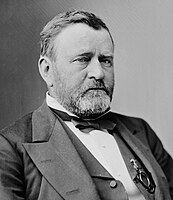
Back انتخابات الرئاسة الأمريكية 1872 Arabic ھەڵبژاردنی سەرۆکایەتیی ویلایەتە یەکگرتووەکانی ئەمریکا (١٨٧٢) CKB Præsidentvalget i USA 1872 Danish Präsidentschaftswahl in den Vereinigten Staaten 1872 German Elecciones presidenciales de Estados Unidos de 1872 Spanish انتخابات ریاستجمهوری ایالات متحده آمریکا (۱۸۷۲) Persian Yhdysvaltain presidentinvaalit 1872 Finnish Élection présidentielle américaine de 1872 French הבחירות לנשיאות ארצות הברית 1872 HE Elezioni presidenziali negli Stati Uniti d'America del 1872 Italian
| ||||||||||||||||||||||||||||||||
352 members[a] of the Electoral College 177 electoral votes needed to win | ||||||||||||||||||||||||||||||||
|---|---|---|---|---|---|---|---|---|---|---|---|---|---|---|---|---|---|---|---|---|---|---|---|---|---|---|---|---|---|---|---|---|
| Turnout | 72.1%[1] | |||||||||||||||||||||||||||||||
| ||||||||||||||||||||||||||||||||
 Presidential election results map. Red denotes states won by Grant/Wilson (Republican). Other colors (except gray) denote states won by Greeley/Brown (Liberal Republican and Democratic). The different colors reflect the posthumous scattering of Greeley's electoral votes: purple denotes Electoral College votes won by Greeley, blue denotes those won by Thomas A. Hendricks, pink denotes those won by Benjamin Gratz Brown, green denotes those won by Charles J. Jenkins, and dark red denotes those won by David Davis. Numbers indicate the number of electoral votes allotted to each state. | ||||||||||||||||||||||||||||||||
| ||||||||||||||||||||||||||||||||
The 1872 United States presidential election was the 22nd quadrennial presidential election, held on Tuesday, November 5, 1872. Despite a split in the Republican Party, incumbent President Ulysses S. Grant defeated Democratic-endorsed Liberal Republican nominee Horace Greeley.
Grant was unanimously re-nominated at the 1872 Republican National Convention, but his intra-party opponents organized the Liberal Republican Party and held their own convention. The 1872 Liberal Republican convention nominated Greeley, a New York newspaper publisher, and wrote a platform calling for civil service reform and an end to Reconstruction. Democratic Party leaders believed that their only hope of defeating Grant was to unite around Greeley, and the 1872 Democratic National Convention nominated the Liberal Republican ticket.
Despite the union between the Liberal Republicans and Democrats, Greeley proved to be an ineffective campaigner and Grant remained widely popular. Grant decisively won re-election, carrying 31 of the 37 states, including several Southern states that would not again vote Republican until the 20th century. Grant was the last incumbent to win a second consecutive term until William McKinley's victory in the 1900 presidential election,[c] and his popular vote margin of 11.8% was the largest margin between 1856 and 1904.
On November 29, 1872, after the popular vote was counted, but before the Electoral College cast its votes, Greeley died. As a result, electors previously committed to Greeley voted for four candidates for president and eight candidates for vice president. The election of 1872 also remains the only instance in U.S. history in which a major presidential candidate who won electoral votes died during the election process. This election set the record for the longest Republican popular vote win streak in American history, four elections, a record that was matched by the same party in 1908. In terms of electoral votes, it was improved with a fifth and sixth consecutive victory in 1876 and 1880. Grant thus became the only president to serve two full, consecutive terms between Andrew Jackson (1829–1837) and Woodrow Wilson (1913–1921). Additionally, he is one of only four Republican presidents to have served two full terms in office, the others being Dwight D. Eisenhower, Ronald Reagan, and George W. Bush. Three other Republican presidents: Abraham Lincoln, William McKinley, and Richard Nixon, were also reelected to their second term, but both Lincoln and McKinley were assassinated in 1865 and 1901, respectively, while Nixon resigned in 1974 before the completion of his second term.
Cite error: There are <ref group=lower-alpha> tags or {{efn}} templates on this page, but the references will not show without a {{reflist|group=lower-alpha}} template or {{notelist}} template (see the help page).
- ^ "National General Election VEP Turnout Rates, 1789-Present". United States Election Project. CQ Press.

